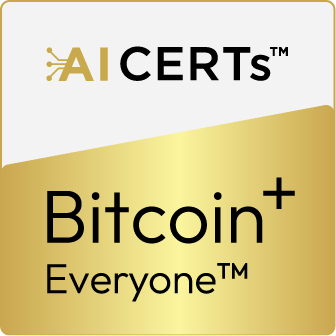Bitcoin+ Executive™
BC-100
Empowering Executives with Bitcoin Innovation- Comprehensive Overview: Learn blockchain mechanics, smart contracts, and DApps
- Strategic Insight: Gain understanding of emerging technologies and applications
- Leadership Prep: Perfect for executives needing a strategic blockchain foundation
Why This Certification Matters
At a Glance: Course + Exam Overview
- Instructor-Led: 1 day (live or virtual)
- Self-Paced: 6 hours of content

Who Should Enroll?
Blockchain Strategists: Gain in-depth knowledge of Bitcoin’s impact on business strategies and learn to drive blockchain adoption in organizations.
Cryptocurrency Investors: Understand the technical and financial aspects of Bitcoin to make informed investment decisions and manage portfolios effectively.
Enterprise Architects: Master how to design and implement Bitcoin-based solutions at scale, ensuring seamless integration with existing systems.
Fintech Professionals: Explore Bitcoin’s role in revolutionizing financial services, from payment systems to secure digital currencies.
Technology Leaders: Stay ahead of the curve by gaining advanced skills in Bitcoin and blockchain technology to lead innovation in the tech industry.
Industry Growth: Enabling Strategic Decision-Making in the Digital Currency Economy
- The global cryptocurrency market size is projected to reach $1,902.5 million in 2028, exhibiting a CAGR of 11.1% during the forecast. (Fortune Business Insights)
- Bitcoin and blockchain are revolutionizing industries like finance, supply chain, and real estate, offering decentralized and transparent solutions.
- The adoption of Bitcoin as a payment method is increasing, with businesses integrating cryptocurrency payment gateways to expand market reach.
- Blockchain technology is critical for sectors like banking and insurance, enhancing security, transparency, and reducing transaction costs.

Skills You’ll Gain
- Blockchain Fundamentals
- Understanding P2P Networks
- Exploring Ethereum and its ecosystem
- Privacy Enhancements
- Legal and Compliance Considerations
What You'll Learn
- Course Introduction
- 1.1 Risks and Benefits
- 1.2 Databases – A Comparative Analysis
- 1.3 Delving into Bitcoin
- 1.4 Bitcoin Vs Blockchain
- 2.1 Deep Dive into Components
- 2.2 Lifecycle of a Bitcoin Blockchain Transaction
- 2.3 Understanding P2P Networks
- 2.4 The Mystery of Consensus Protocols
- 3.1 Bitcoin Scripting Basics
- 3.2 Script Types: P2PKH and P2SH
- 3.3 Script Operations
- 3.4 Multisig Transactions
- 3.5 Escrow Services
- 3.6 Time-Locked Contracts
- 3.7 Atomic Swaps
- 3.8 Payment Channels
- 4.1 Ethereum and its Ecosystem
- 4.2 Introduction to Other Frameworks
- 5.1 Layer 2 Scaling Solutions
- 5.2 Privacy Enhancements
- 5.3 Smart Contracts on Bitcoin
- 5.4 Sidechains and Drivechains
- 5.5 Atomic Swaps
- 5.6 Schnorr Signatures and Taproot
- 5.7 Decentralized Autonomous Organizations (DAOs)
- 5.8 Tokenization and Asset Issuance
- 5.9 Cross-Chain Interoperability
- 5.10 Governance and Protocol Evolution
- 6.1 The Financial Side of Cryptos
- 6.2 Dive into ICOs, DAOs, NFTs, and DeFi
- 6.3 Legal and Compliance
- 7.1 Lightning Network (Layer 2 Solution)
- 7.2 RSK (Rootstock)
- 7.3 Liquid Network (Sidechain Solution)
- 7.4 Atomic Swaps
- 7.5 Lnbits
- 7.6 Bottle Pay
- 7.7 Zap Wallet
- 7.8 Muun Wallet
- 7.9 Sphinx Chat
- 7.10 Tippin.me
- 7.11 SparkSwap
- 7.12 RGB (Colored Coins Protocol)
- 7.13 Bisq
- 8.1 Bitcoin Blockchain Integrations with Emerging Tech
- 8.2 Internet of Things (IoT) Integration
- 8.3 Artificial Intelligence (AI) Integration
- 8.4 Edge Computing Integration
- 8.5 Quantum Computing Integration
- 8.6 Biometrics and Authentication Integration
- 8.7 Supply Chain and Logistics Integration
- 8.8 Decentralized Identity and Authentication Integration
Tools You’ll Master

Glassnode

Blockchain Explorer

CoinMarketCap

Lnbits
Prerequisites
- Functional understanding of computing processes and open networks like internet.
- Basic knowledge to follow pseudocode to understand a concept.
- Ability to understand how various verticals work like finance, supply chains, asset trading etc.
- Fundamental understanding of how business utilizes information technology for process efficiencies and optimizations.
Exam Details
Duration
90 minutes
Passing Score
70% (35/50)
Format
50 multiple-choice/multiple-response questions
Delivery Method
Online via proctored exam platform (flexible scheduling)
Exam Blueprint:
- Introduction to Blockchain and Cryptocurrency – 5%
- Understanding Bitcoin Blockchain Mechanics – 10%
- Bitcoin Script Decentralized Apps – 20%
- Blockchain Frameworks – 15%
- Advanced Blockchain Concepts – 15%
- Cryptocurrencies: Trading, Regulations, and Compliance – 10%
- Bitcoin Real-world Application – 15%
- Blockchain and Other Technologies – 10%
What’s Included (One-Year Subscription + All Updates):
- High-Quality Videos, E-book (PDF & Audio), and Podcasts
- AI Mentor for Personalized Guidance
- Quizzes, Assessments, and Course Resources
- Online Proctored Exam with One Free Retake
- Comprehensive Exam Study Guide
Instructor-Led (Live Virtual/Classroom)
- 1 day of intensive training with live demos
- Real-time Q&A and peer collaboration
- Led by AI Certified Trainers and delivered through Authorized Training Partners
Self-Paced Online
- ~6 hours of on-demand video lessons, e-book, and podcasts
- Learn anywhere, anytime, with modular quizzes to track progress
Discover Your Ideal Role-Based Certifications and Programs!
Not sure which certifications to go for? Take our quick assessment to discover the perfect role-based certifications and programs tailored just for you.
Get CertifiedFrequently Asked Questions
You will gain a comprehensive understanding of blockchain technology and cryptocurrency, including bitcoin blockchains, smart contracts, decentralized applications (DApps), and advanced concepts in the field.
This course is ideal for executives, professionals, and enthusiasts looking to enhance their expertise in blockchain technology and cryptocurrency.
The course includes both theoretical learning and practical applications to ensure participants can apply their knowledge in real-world scenarios.
This certification can open doors to roles such as blockchain consultant, cryptocurrency analyst, technology strategist, or executive positions in companies adopting blockchain solutions.
This certification enhances your credentials in blockchain and cryptocurrency, making you an asset in various industries such as finance, technology, and supply chain management.


